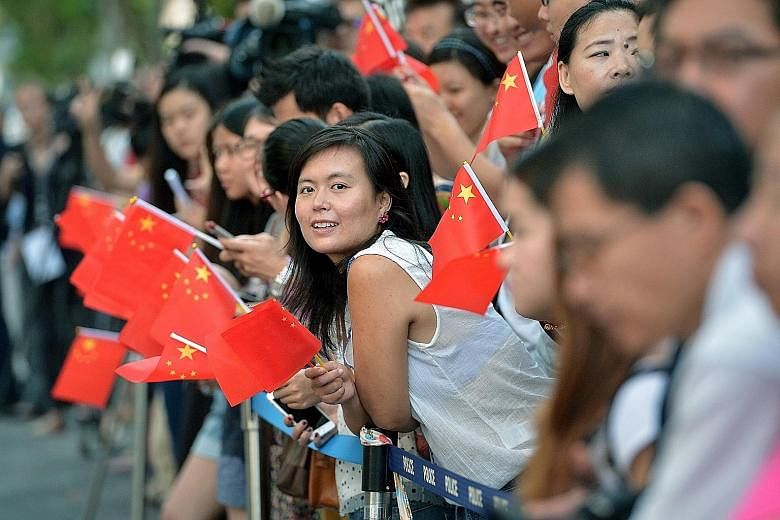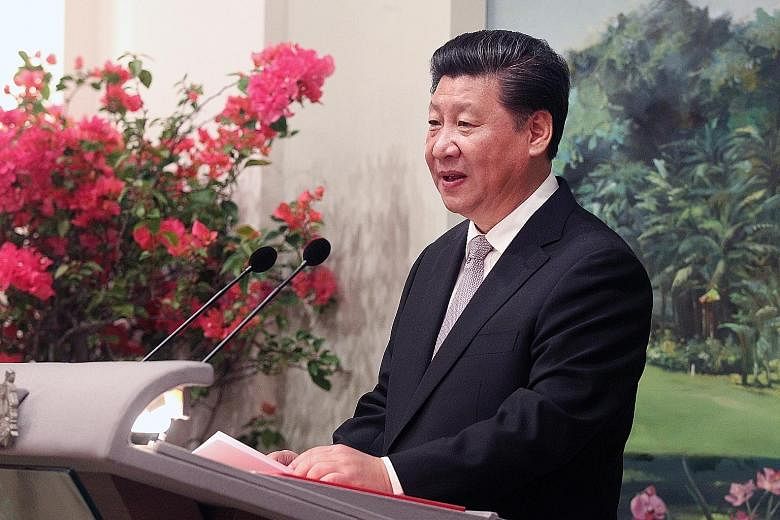SINGAPORE - The slew of agreements and strategic moves made between Singapore and China during Chinese President Xi Jinping's visit will improve the bilateral relationship, create opportunities for both sides and provide a boost to regional initiatives, analysts said.
But there are also challenges, such as the potential impact on Singapore's regional policy after a mutual pledge with China to deepen cooperation on regional issues, they added.
East Asian Institute assistant director Lye Liang Fook said Mr Xi's two-day state visit from last Friday shows both sides continue to find new areas of cooperation to "add to their substantive relationship", based on the eight pacts signed.
One pact he cited is the substantive upgrade of the 2009 China-Singapore Free Trade Agreement (CSFTA), for which talks are targeted to be concluded by next year. Mr Lye believes the upgrade will have a catalytic effect on the Regional
Comprehensive Economic Partnership comprising the 10-member Asean grouping and six dialogue partners, including China. The upgrade is also likely to bring into CSFTA elements from the United States-led Trans-Pacific Partnership - which Singapore is part of but not China.
"In doing so, it will bring China closer to meeting the standards of the TPP ," Mr Lye told The Straits Times. China is often said to be unable to meet the requirements of the TPP, envisaged to be a high-standards FTA for the 21st century.
Another key pact is the launch of the third government-led project in south-western Chongqing city, which is known as the "China-Singapore (Chongqing) Demonstration Initiative on Strategic Connectivity", and comes after the 1994 Suzhou Industrial Park and the 2008 Tianjin Eco-city.
Analysts say the project's focus on financial services, aviation, transport and logistics, and information and communications technology will leverage Singapore's expertise in those four areas.
The new initiative is designated as a priority demonstration project under China's regional strategies, like Mr Xi's "One Belt, One Road" initiatives to boost China's trade links with Europe via Central Asia and South-east Asia.
SIM University's East Asia specialist Lim Tai Wei said it is no secret that China's western regions are the main target of its next phase of development through the "One Belt, One Road" project and that Chongqing, as the most populous city in that region, is well placed to become a major hub.
One challenge is in making sure the Chongqing project creates opportunities for Singapore companies to reap commercial benefits, said Mr Lye.
He added that Singapore needs to strike a fine balance between agreeing to new projects with China and not overstretching its resources.
International relations expert Li Mingjiang said the new "All-Round Cooperative Partnership Progressing with the Times" established during Mr Xi's visit showed that both sides saw a need to redefine their long-term ties.
But by agreeing to strengthen cooperation with China on regional and global issues, Singapore may come under pressure from Beijing to act according to the latter's expectations, said Professor Li.
"When you engage in closer consultation, naturally there will be pressure from China. China may want Singapore to be less vocal and perhaps expect it to pay more attention to China's interests, especially those it has high stakes in," he said.
Dr Lim said that Singapore must be sensitive and mindful of other countries with whom it enjoys close ties after its decision to enter the new all-round partnership with China.
SEE EDITORIAL



